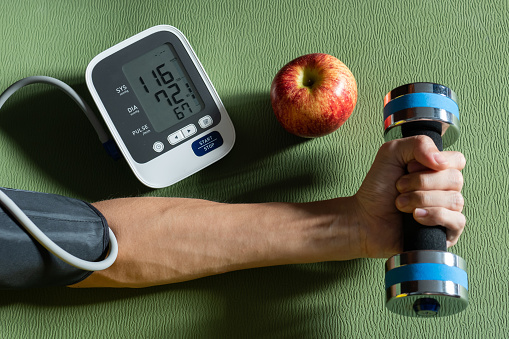The #1 Rated Blood Sugar Formula
Ways to control high blood pressure (Without drugs)

High blood pressure increases the risk of both heart attack and stroke. It is important to know your numbers because if you have high blood pressure, you will want to lower it.
Here are 10 ways to lower blood pressure without drugs.
1. Lose the extra pounds and watch your waistline
Blood pressure often increases as weight increases. Being overweight can also cause breathing disturbances during sleep (sleep apnea), which further raises blood pressure.
Losing weight is one of the most effective lifestyle changes to control blood pressure. Losing even a small amount of weight, if you are overweight or obese, can help lower your blood pressure. In general, you can lower your blood pressure by about 1 millimeter of mercury (mm Hg) with each kilogram (about 2.2 pounds) of weight loss.
2. Exercise regularly
Regular physical activity, such as 150 minutes a week or about 30 minutes most days of the week, can lower blood pressure by about 5 to 8 mm Hg if you have high blood pressure. It's important to be consistent, because if you stop exercising, your blood pressure can rise again.
If you have elevated blood pressure, exercise can help you avoid developing hypertension. If you already have hypertension, regular physical activity can lower your blood pressure to a safe level.
3. Eat a healthy diet
Eating a diet that is rich in whole grains, fruits, vegetables and low-fat dairy products and skimps on saturated fat and cholesterol can lower blood pressure by as much as 11 mm Hg if you have high blood pressure. This eating plan is known as the DASH (Dietary Approaches to Stop Hypertension) diet.
4. Reduce the amount of sodium in your diet
Even a small reduction in dietary sodium can improve heart health and lower blood pressure by about 5 to 6 mm Hg if you have high blood pressure.
The effect of sodium intake on blood pressure varies among different groups of people. In general, limit sodium to 2,300 milligrams (mg) per day or less. However, a lower sodium intake of 1,500 mg per day or less is ideal for most adults.
5. Limit the amount of alcohol you drink
Alcohol can be both good and bad for your health. By drinking alcohol only in moderation, generally one drink a day for women or two a day for men, you can potentially lower your blood pressure by about 4 mm Hg. One drink is 12 ounces of beer, 5 ounces of wine or 1.5 ounces of 80-proof liquor.
6. Quit smoking
Each cigarette smoked raises blood pressure for many minutes after smoking it. Smoking cessation helps blood pressure return to normal. Quitting smoking can reduce the risk of heart disease and improve overall health. People who quit smoking may live longer than those who never quit.
7. Limit caffeine
The role caffeine plays in blood pressure is still debated. Caffeine can raise blood pressure up to 10 mm Hg in people who rarely consume it. However, people who drink coffee regularly may experience little or no effect on blood pressure.
Although the long-term effect of caffeine on blood pressure is not clear, it is possible that blood pressure may increase slightly.
To see if caffeine raises your blood pressure, check your blood pressure within 30 minutes of drinking a caffeinated beverage. If your blood pressure rises by 5 to 10 mm Hg, you may be sensitive to the blood pressure-raising effects of caffeine. Talk to your doctor about the effects of caffeine on blood pressure.
8. Reduce your stress
Chronic stress can contribute to high blood pressure. More research is needed to determine the effect of chronic stress on blood pressure. Occasional stress can also contribute to high blood pressure if you respond to it by eating unhealthy foods, drinking alcohol or smoking cigarettes.
Take some time to think about what is causing you to feel stressed, such as work, family, finances or illness. Once you know what is causing your stress, think about how you can eliminate or reduce it.
9. Control your blood pressure at home and visit your doctor regularly
Monitoring your blood pressure at home can help you control your blood pressure, make sure your lifestyle changes are working, and alert you and your doctor to potential health complications. Blood pressure monitors are widely available and do not require a prescription. Before you start monitoring your blood pressure at home, talk to your doctor.
10. get support
Supportive family and friends can help improve your health. They can encourage you to take care of yourself, drive you to the doctor's office, or start an exercise program with you to keep your blood pressure low.
If you find that you need support beyond family and friends, consider joining a support group. This will put you in touch with people who can add to your emotions or boost your morale, and who can offer practical tips on how to cope with the disease.
[cool_tag_cloud on_single_display="local"]





